March 31, 2019 📊 Why Trump's New Health Care Crusade Will Probably Backfire
Plus, will the UK ever leave the EU? And the Green New Deal is more popular than you think, even in Republican states—well, at least some parts of it are.
Welcome! I’m G. Elliott Morris, data journalist for The Economist and blogger of polls, elections, and political science. Happy Sunday! Here’s my weekly email with links to what I’ve been reading and writing that puts the news in context with public opinion polls, political science, other data (some “big,” some small) and looks briefly at the week ahead. Let’s jump right in! Feedback? Drop me a line or just respond to this email.
This newsletter is supported by subscribers on Patreon. A special thanks to those who pledge the top two tiers is written in the endnotes. If you enjoy my personal newsletter and want it to continue, consider supporting it on Patreon for just $2.
Dear Reader,
I send this email to you today from amidst bookshelves covering European history at London’s Foyles bookstore. I’ve found a riveting book about the Napoleon Wars, but cannot buy it, as there is no additional capacity in my luggage for more books.
This week’s letter will dive head-first into the electoral calculus of health care politics in the US—spoiler: opposing public care is a bad idea—and cover some aspects of the 2020 race, the Green New Deal, and more. This week was also a tumultuous one for UK politics, with Prime Minister Theresa May unable to whip enough votes to support a stripped-down version of her Brexit plan. The failure comes after Parliament also failed to reach consensus on a number of symbolic votes for alternative plans. I have written about this for my staff job, and have additional thoughts about the current crisis of government in the UK, but will reserve them for later. If nothing happens in US politics next week (fat chance of that!) then I’ll dive more into the issue in next week’s dispatch.
Thanks for reading my weekly email. If you like it, please do forward to a friend. The more readers the merrier!
Elliott
This Week's Big Question
Trump’s Renewed Pledge to Repeal Obamacare is a Bad Electoral Strategy
Republicans’ destructive position on health care policy was a big reason why they lost 40 House seats in last year’s mid-term elections. Trump risks bearing this electoral toll again in 2020 if he continues to bring up the issue.
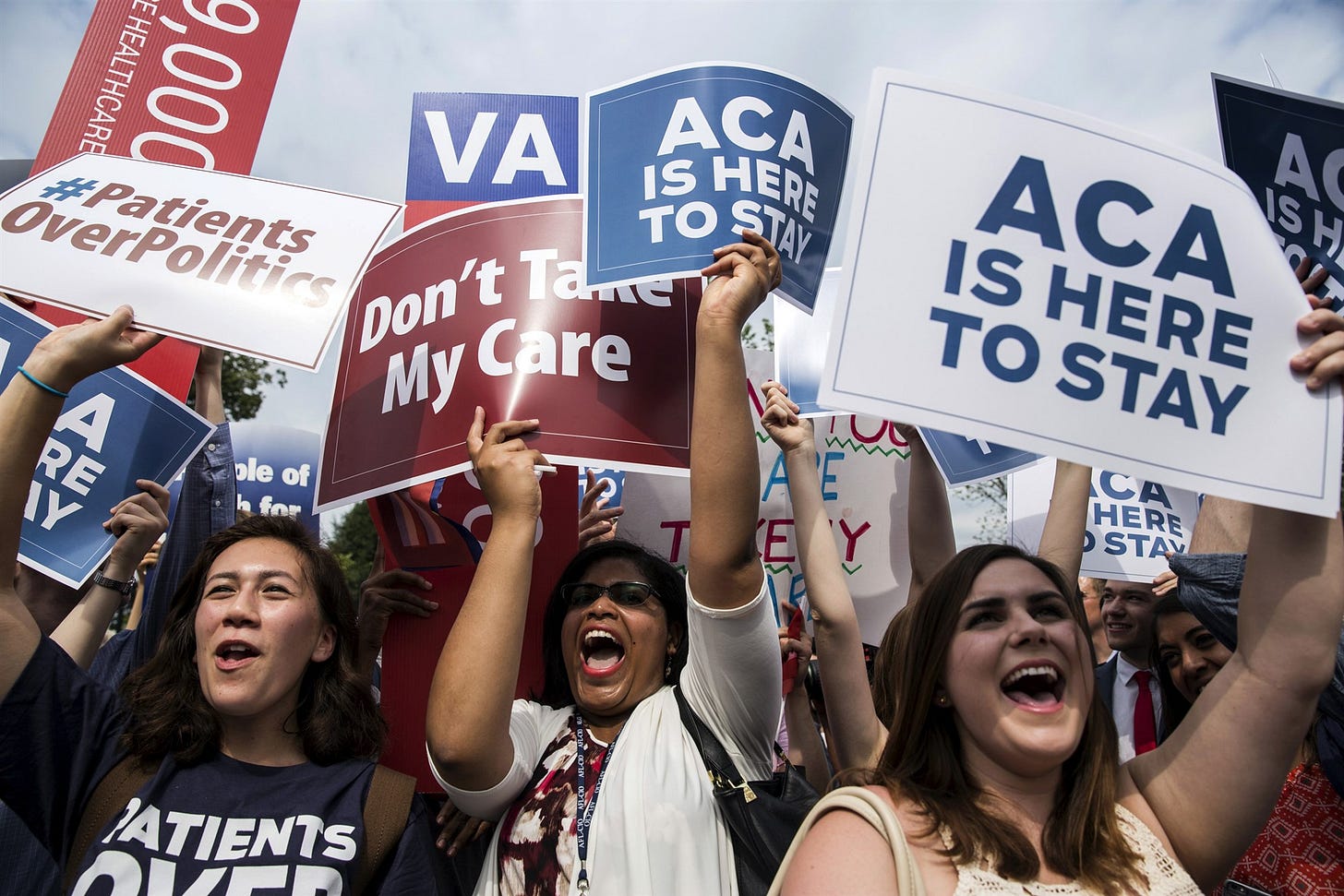
Image: NBC News/Reuters
Speaking to the press before attending a policy lunch on Capitol Hill last Tuesday, Donald Trump renewed his crusade against the Affordable Care Act (ACA) and pledged that “the Republican Party will soon be known as the party of health care.” “Just you watch,” Trump said. Last time he invited voters to take front-row seats to his attempted dismantling of the ACA (or “Obamacare”) he lost a significant amount of ground in the public’s approval of the job he was doing as president. (Of course, he also faced a reckoning in the polls last November, but partially for other reasons as well. We’ll touch on this later.) The share of Americans that approved of him fell from 42% to 37% during the course of the prolonged fight over the GOP-proposed American Health Care Act and Better Care Reconciliation Act in the spring and summer of 2017:
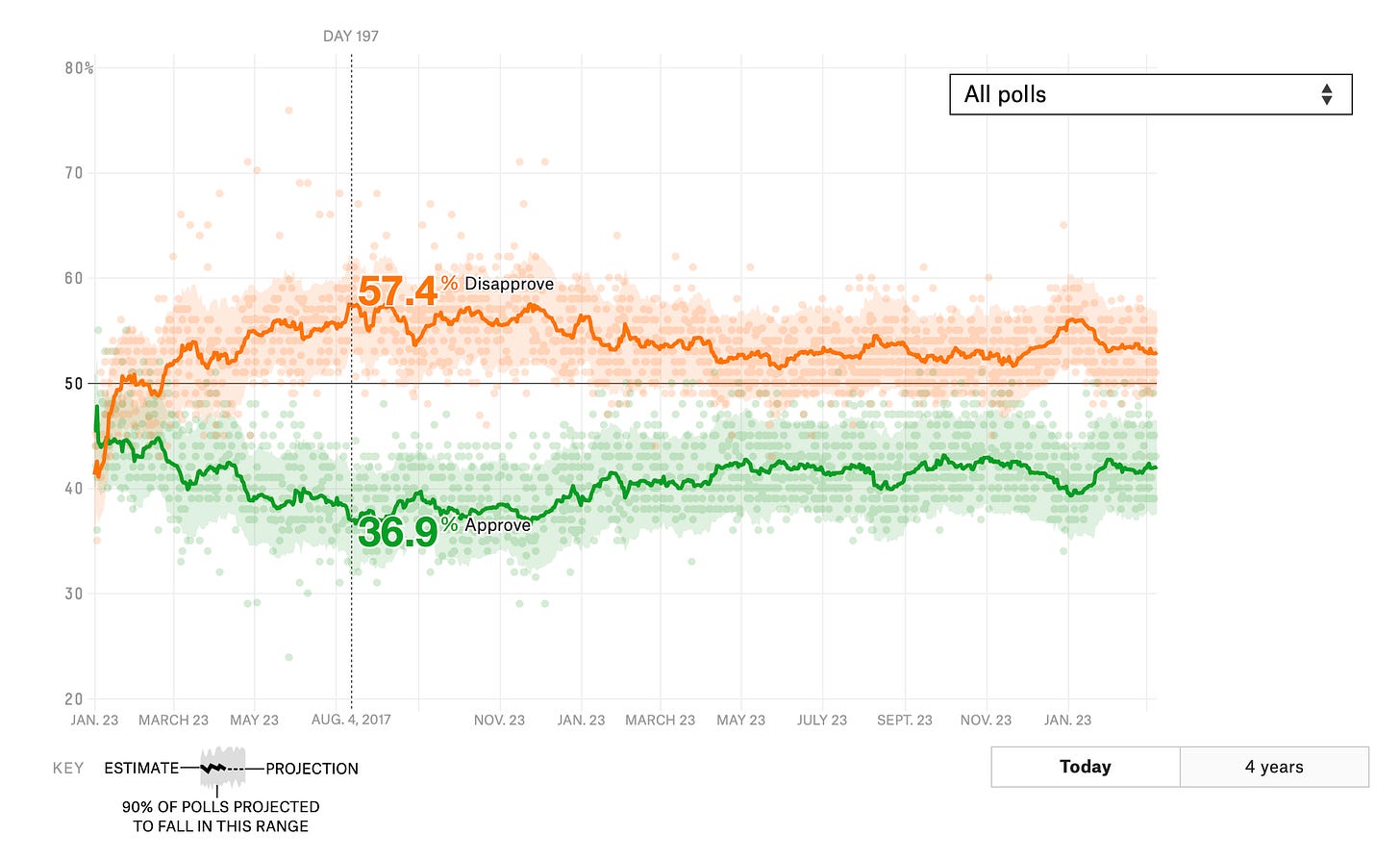
The ultimate issue for Trump, simply, is that the people want to keep their health coverage. Once unpopular, the favorability of the Affordable Care Act has rebounded impressively since president Trump took office. According to polls from the Kaiser Family Foundation, analyzed by FiveThirtyEight’s Dhrumil Mehta, Americans’ average net favorability of the health care law increased from -4 in 2016 to +12 in 2017, a 16 percentage point jump. And this March, their poll showed that Americans’ net favorability of the law was sitting at +10. Health care entitlements are simply more popular than they used to be.
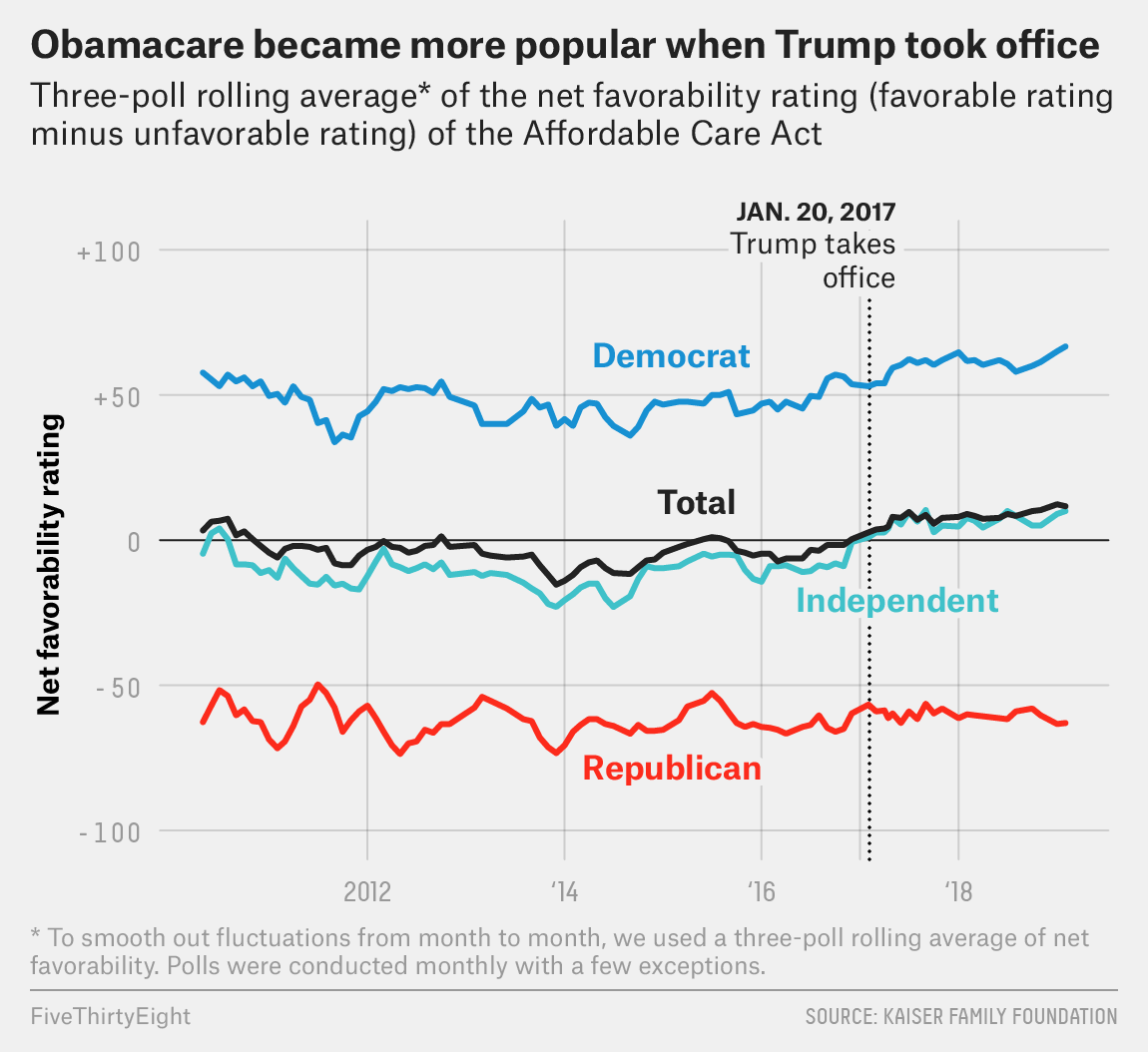
It is one thing to say that Trump’s moves on health care are unpopular. And they still are, by the way; a Fox poll from March 24th found that only 37% of voters approve of the way he is handling health care, compared with 52% who disapprove. But it’s another thing entirely to say that Trump’s and the GOP’s position is costing them votes. According to my analysis of the 2018 Cooperative Congressional Election Study (CCES), a survey of 60,000 Americans from researchers at Harvard and elsewhere, it very well could be.
I set out to crunch the numbers on whether Trump voters who opposed full ACA repeal were more likely to vote for Democrats in 2018 than those who agreed with him on repeal. I find this to be the case. My analysis suggests that, all else being equal, a voter who supports the law was about 5 percentage points more likely to vote for a Democrat in the 2018 House mid-terms than someone who agrees with the president about repeal. (To be sure, the way I ran the model, opinions on a policy other than health care could be driving the relationship, but my gut says I doubt it. You can get more context about this analysis by reading my corresponding blog post. It’s a first cut at something I’ll expand upon later.)
Projecting forward to 2020, it’s clear that a new GOP-led crusade against the ACA could make a significant dent in Trump’s support among midwestern voters—who, you may recall, were crucial to his upset victory in the Electoral College some two and a half years ago. Again according to my number-crunching of the 2018 CCES, about 55% of midwesterners oppose full repeal, including 22% of Trump voters. The analysis says that 16% of ACA-approving midwestern Trump voters cast their ballots for House Democrats last year, vs a disaffection percentage of 3% among those who supported repealing the ACA. In 2020, this means that Trump could be facing losses of about 6% of his voters (math: 78% * 0.03 + 22% * 0.16). Of course, midwestern voters are also more likely to ticket-split for Democrats down-ballot, so this share could be overstated. But if even half of the mid-term deserters opt for the Democratic candidate in 2020, Trump would face long odds of being re-elected. His renewed health care fight, simply, is bad strategy.
…
The lesson of 2017-18 is that you don’t get rewarded for taking away (or trying to take away) voters’ entitlements. Trump would be wise to shy away from the issue, though it looks like he’s doing the opposite. My analysis of the data says he’ll face a reckoning yet again if he tries to repeal the ACA, which is now favored by ten percentage points more Americans than the share who oppose it. Though the issue runs deeper than the following simple axiom, I think it to be apt: For re-election odds, it never a great idea to oppose something that is supported by more voters than those who oppose it.
And now, the most notable stuff I read and wrote last week:
Political Data
From me for The Economist: Robert Mueller is more popular with Trump voters than he has ever been
A survey of 1,500 Americans conducted on The Economist’s behalf by YouGov, a pollster, found in early March that among respondents who said they had voted for Mr Trump in 2016, 73% disapproved of Mr Mueller and just 11% approved of him. Now this group has made an about-turn. In the most recent survey from YouGov—conducted partially after the special counsel’s main findings were reported to Congress and made public—Mr Mueller remained unpopular, but by a much smaller margin of 52% disapproval to 32% approval.
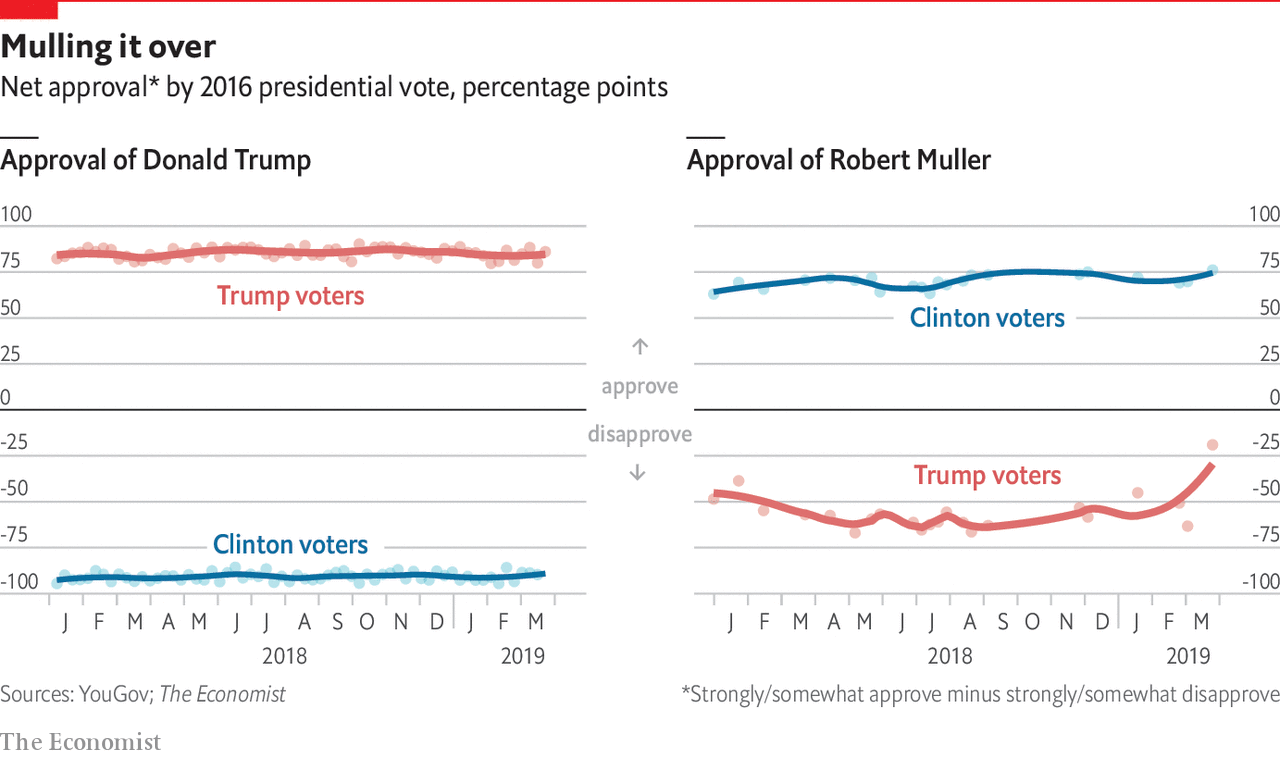
PS: Eli Yokely found the same thing with Morning Consult’s data. Read: ”Trump’s Popularity Unchanged After Completion of Mueller Probe”
Also from me: MPs’ Brexit votes reveal myriad divisions among the Tories
The Economist has run a statistical analysis on the 13 different votes—including two meaningful votes, eight indicative votes and a vote on March 29th on just part of Mrs May’s deal. This found that the Tories are fractured into as many as 15 different clusters, whereas the Labour Party and other opposition groups are much more compact.
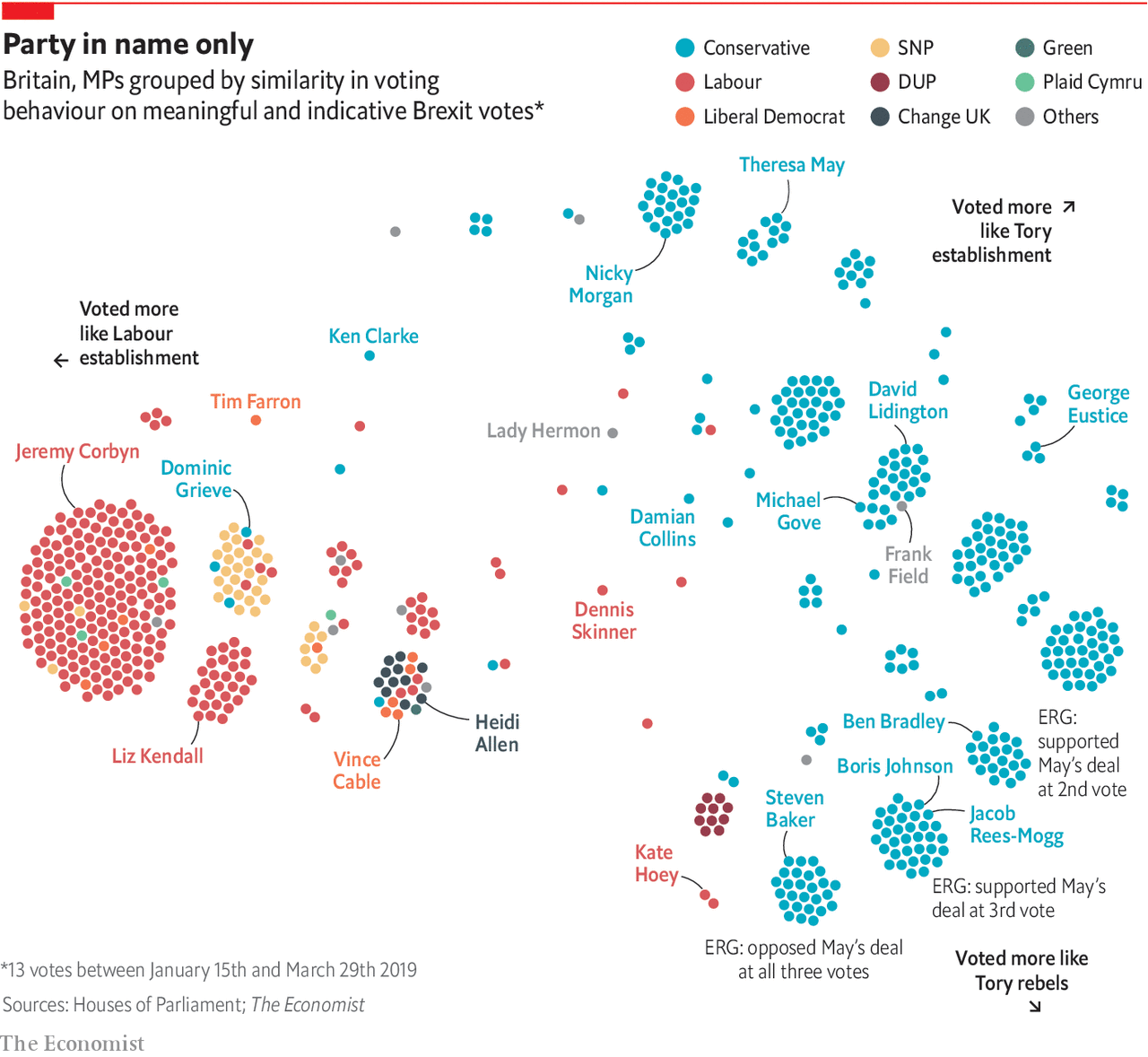
There’s also this graph, but it didn’t make it in the final piece:
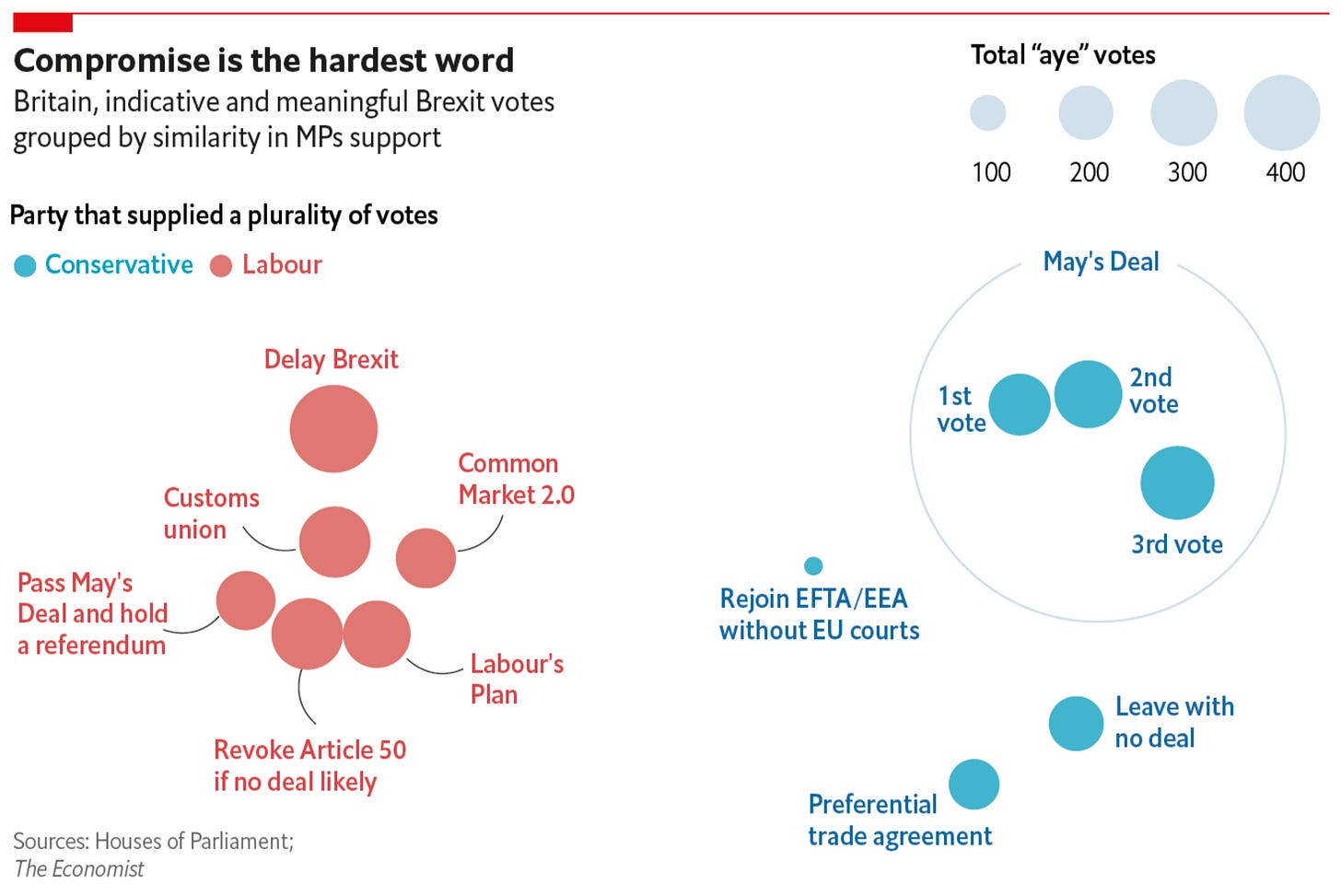
Thomas B. Edsall (NYT): “On Paper, the Election Is the Democrats’ to Lose”
The result of the Mueller investigation has set back Democratic hopes for an easy victory; the history of presidents running for a second term favors incumbents; and the economy under Trump is booming.
Trump, however, has stepped on his own re-election prospects. His 2020 budget proposal calls for a $845 billion cut over 10 years in Medicare, a $25 billion cut in Social Security and a $1.5 trillion cut in Medicaid — programs that benefit the old, the disabled and the poor.
More recently, the Department of Justice announced its support for a suit brought by a group of Republican attorneys general seeking to have the entire Affordable Care Act — which currently provides medical care for 8.5 million Americans — declared invalid. This foreshadows Trump’s gamble on his continuing ability to sell the dark issues of racial resentment and cultural alienation that dominated the 2016 campaign.
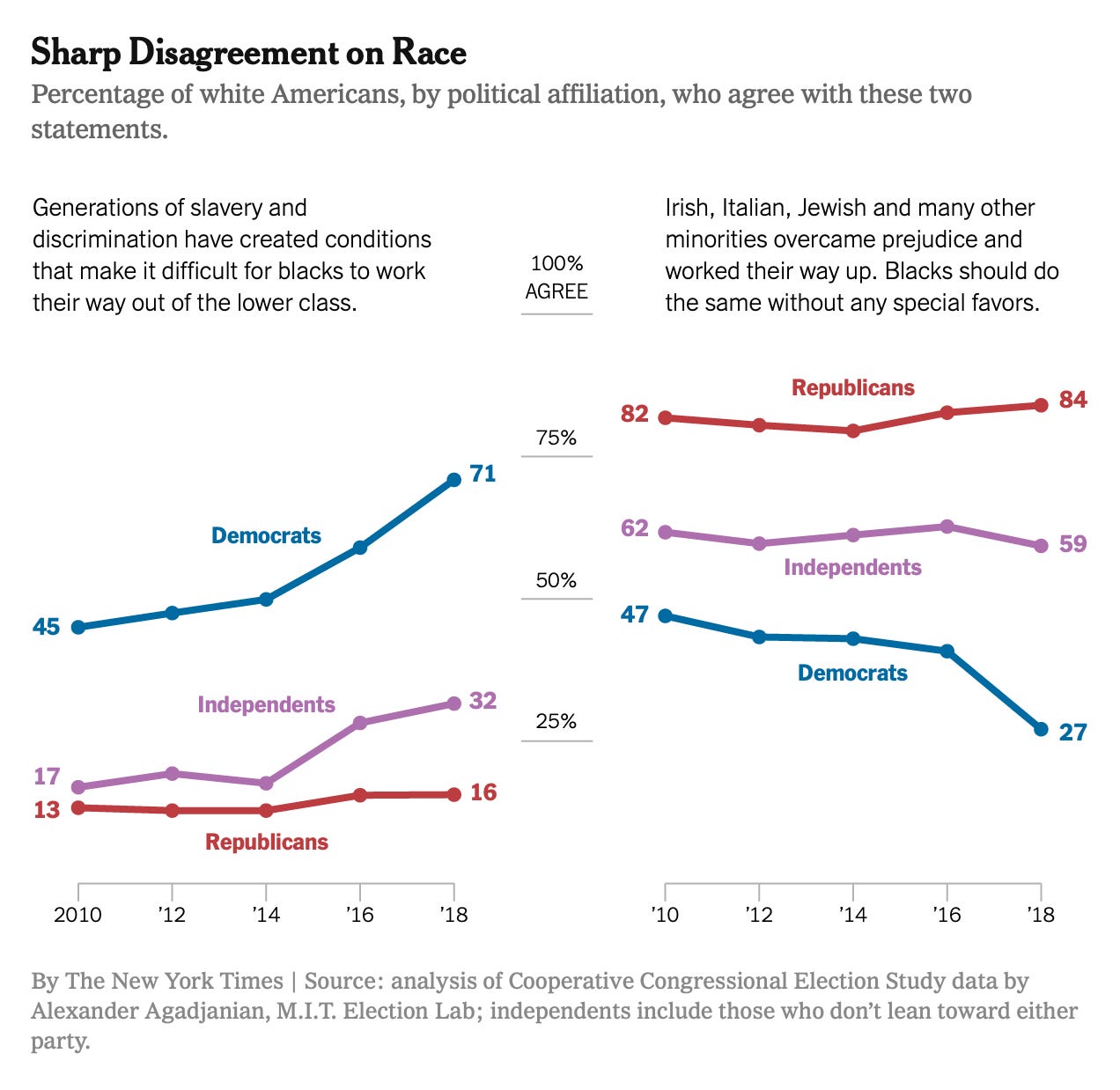
Harry Stevens (Axios): First of its kind study shows CEO political donations favor GOP
The big picture: The chief executives of America's largest public companies are more than twice as likely to lean Republican in their campaign contributions than to favor Democrats.
Among big energy companies, CEOs' Republican leanings are even stronger: more than 9 in 10 energy CEOs side with Republicans, and none with Democrats.
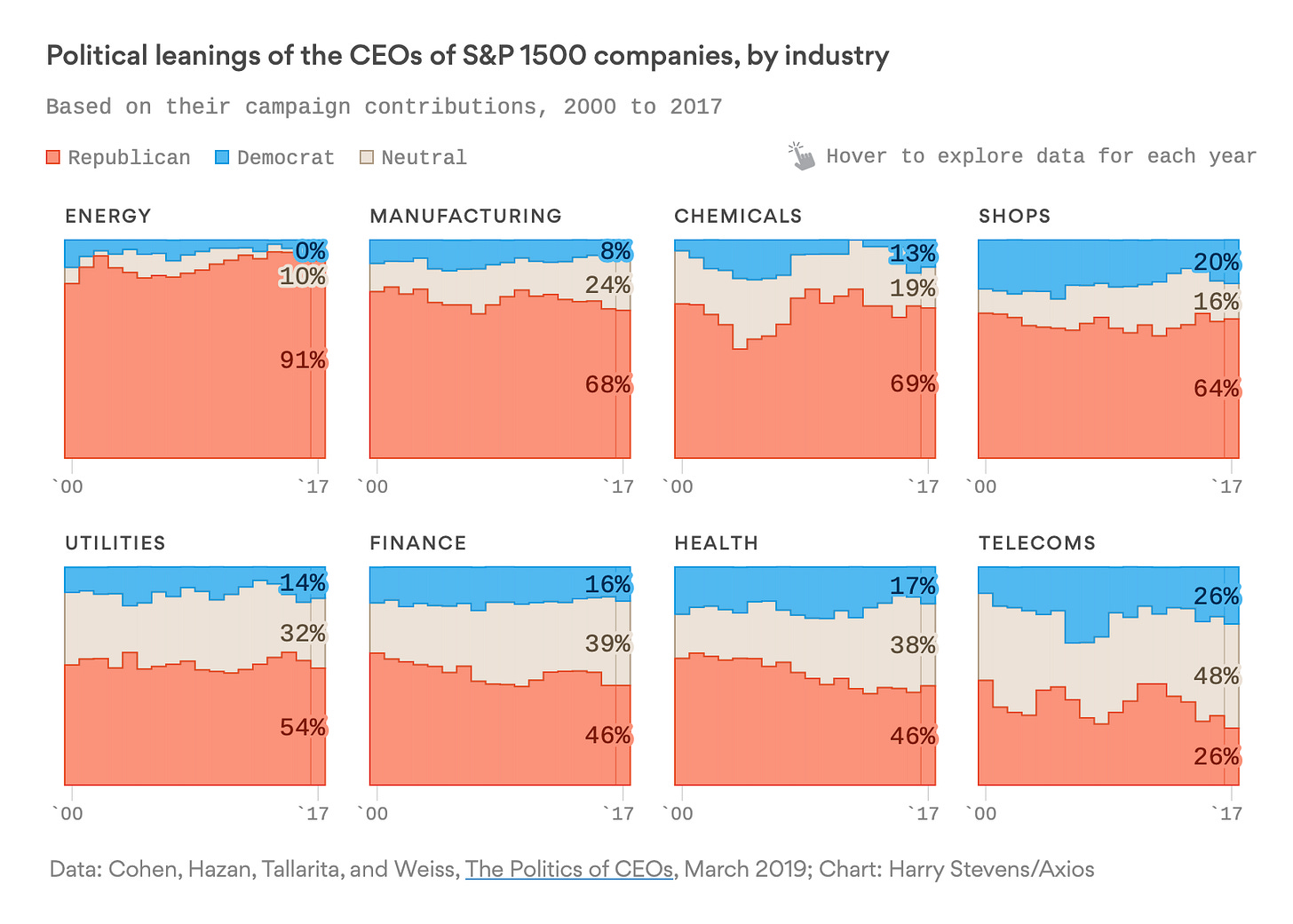
Geoffrey Skelley (FiveThirtyEight): Trump’s Approval Rating Is Incredibly Steady. Is That Weird Or The New Normal?
As Democrats and Republicans move farther apart politically, the specifics of a president’s job performance may become secondary considerations for voters in forming an opinion of how he’s doing. “People are more likely to judge candidates and policies solely on the basis of their party,” said Christopher Federico, a professor of political psychology at the University of Minnesota. “If everything boils down to party, then there’s less room for other stuff that a president might be held responsible for — like a bad economy or increased casualties in a foreign military engagement — to move that president’s approval around.”
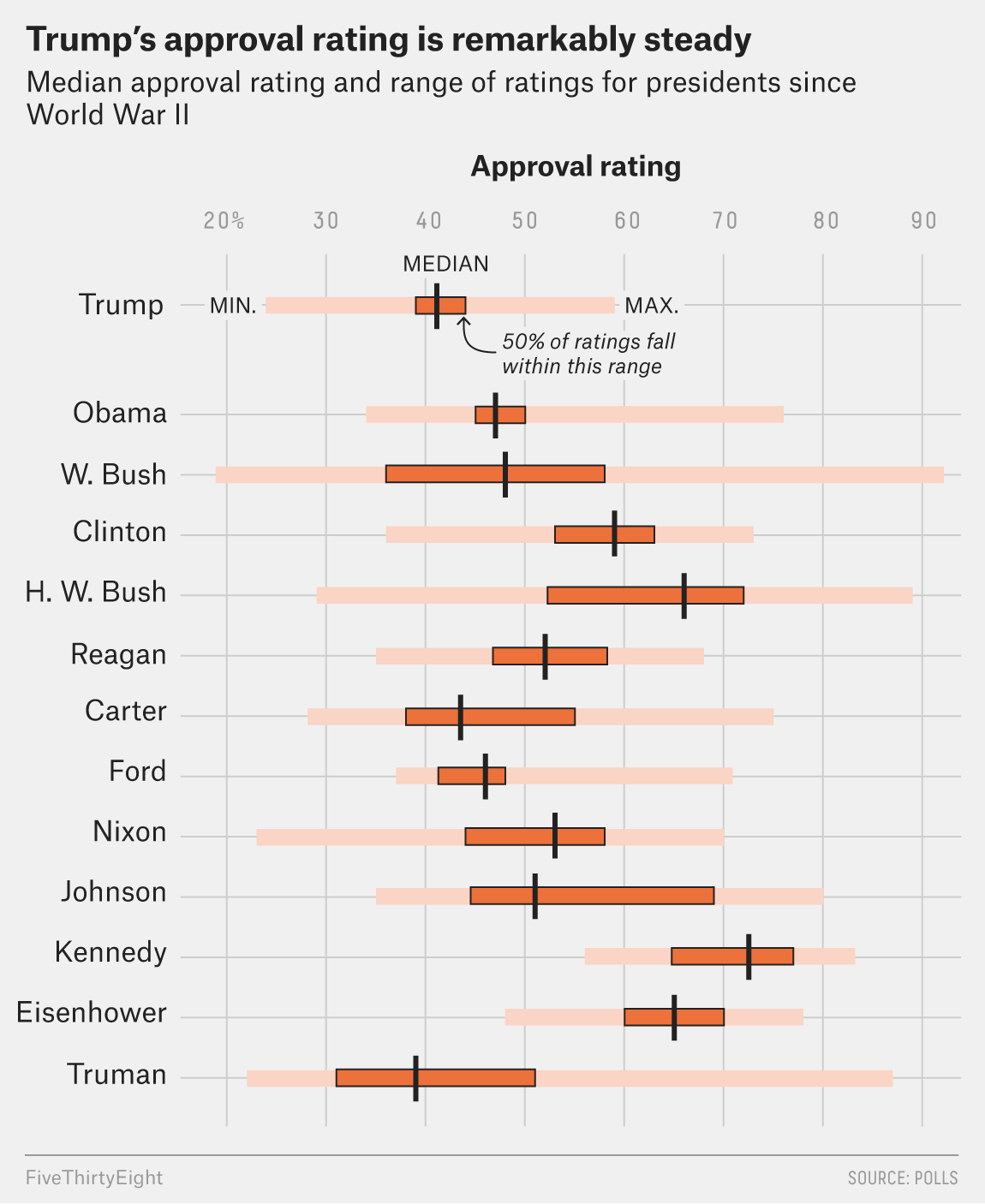
Scott Clement and Karoun Demirjian (WaPo): Mueller report findings upend partisan views of probe, poll finds
Among Democrats, who long expressed faith in Mueller during the inquiry, 53 percent now say they are disappointed with its conclusions. And while most still approve of Mueller’s efforts, more than 6 in 10 Democrats do not accept his finding on whether Trump conspired with Russia.
Over the course of Mueller’s 22-month investigation, and as the special counsel racked up indictments of individuals in Trump’s inner circle, many Democrats in public office had expressed confidence that the inquiry would reveal something crippling about Trump, and were as shocked as once-skeptical Republicans were elated when Barr delivered Mueller’s principal conclusions.
Perhaps unsurprisingly, the end of the investigation has done little to shake partisans’ convictions about Trump’s guilt or innocence. A 76 percent majority of Democrats thinks Trump committed serious wrongdoing related to Russian election interference or the investigation that followed, including nearly two-thirds who say he committed a crime. Separately, 8 in 10 Democrats think Trump tried to hinder the Russia investigation and committed obstruction of justice in the process.
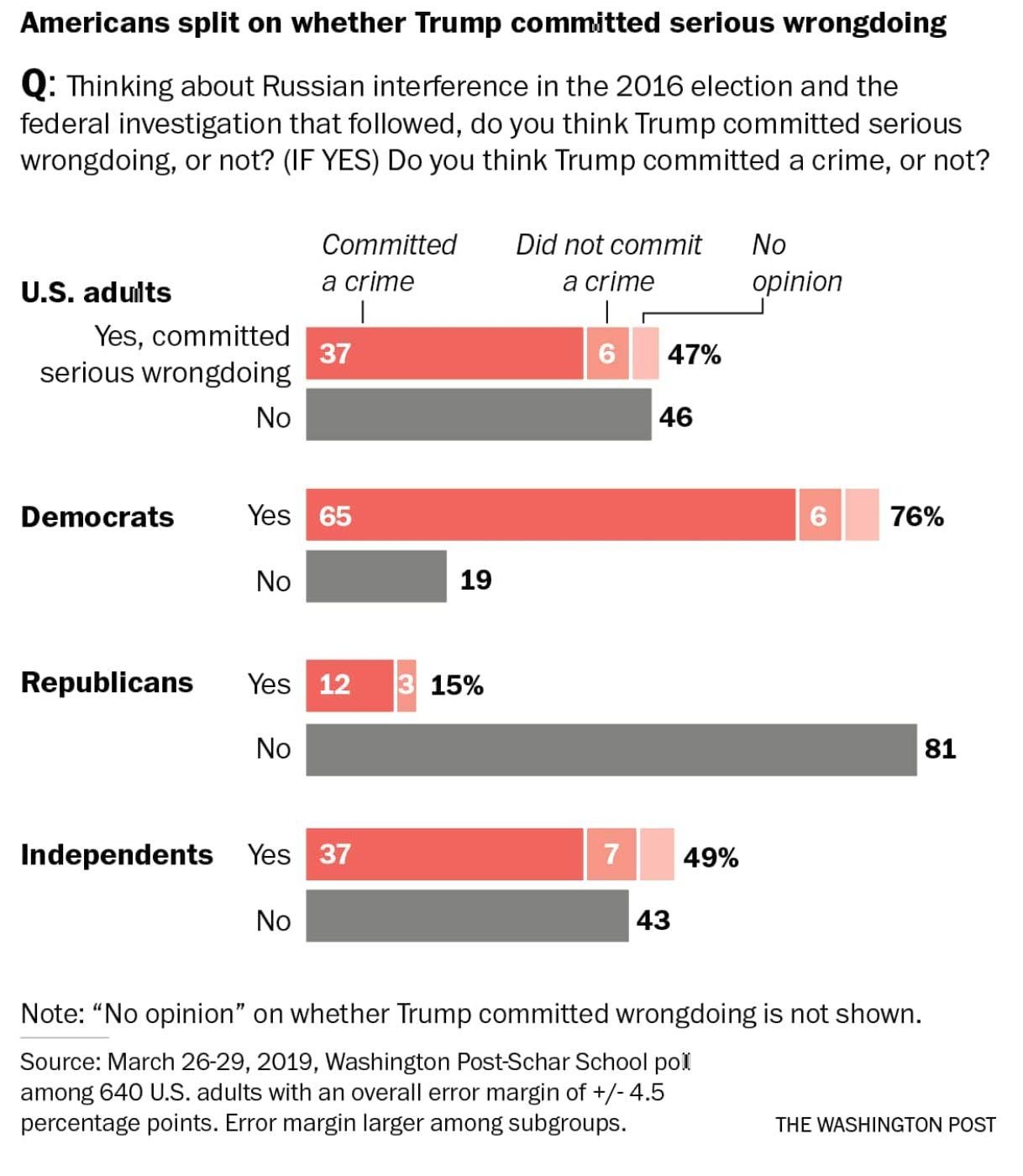
Sean McElwee (NYT): People Actually Like the Green New Deal
We also asked YouGov Blue to survey the Green New Deal. Our YouGov survey asked, “Would you support or oppose a Green New Deal to end fossil fuel use in the United States and have the government create clean energy jobs? The plan would be paid for by raising taxes, including a tax on carbon emissions.” With this framing,43 percent of registered voters expressed support, with 38 percent opposed and the rest unsure.
Not all parts of the Green New Deal are popular. In our polling with Civis, a full shift to electric cars by 2030 and the phasing out of all power plants by 2035 were both underwater. And there is no doubt that some additional parts will lose support after facing a right-wing onslaught. On the other hand, policies like green jobs, drinking water infrastructure and reforestation were wildly popular. Clean water had net support in every state in the country, and reforestation is underwater in Wyoming only. In other words, there is no part in the country where at least some aspects of the Green New Deal will not be winning issues.
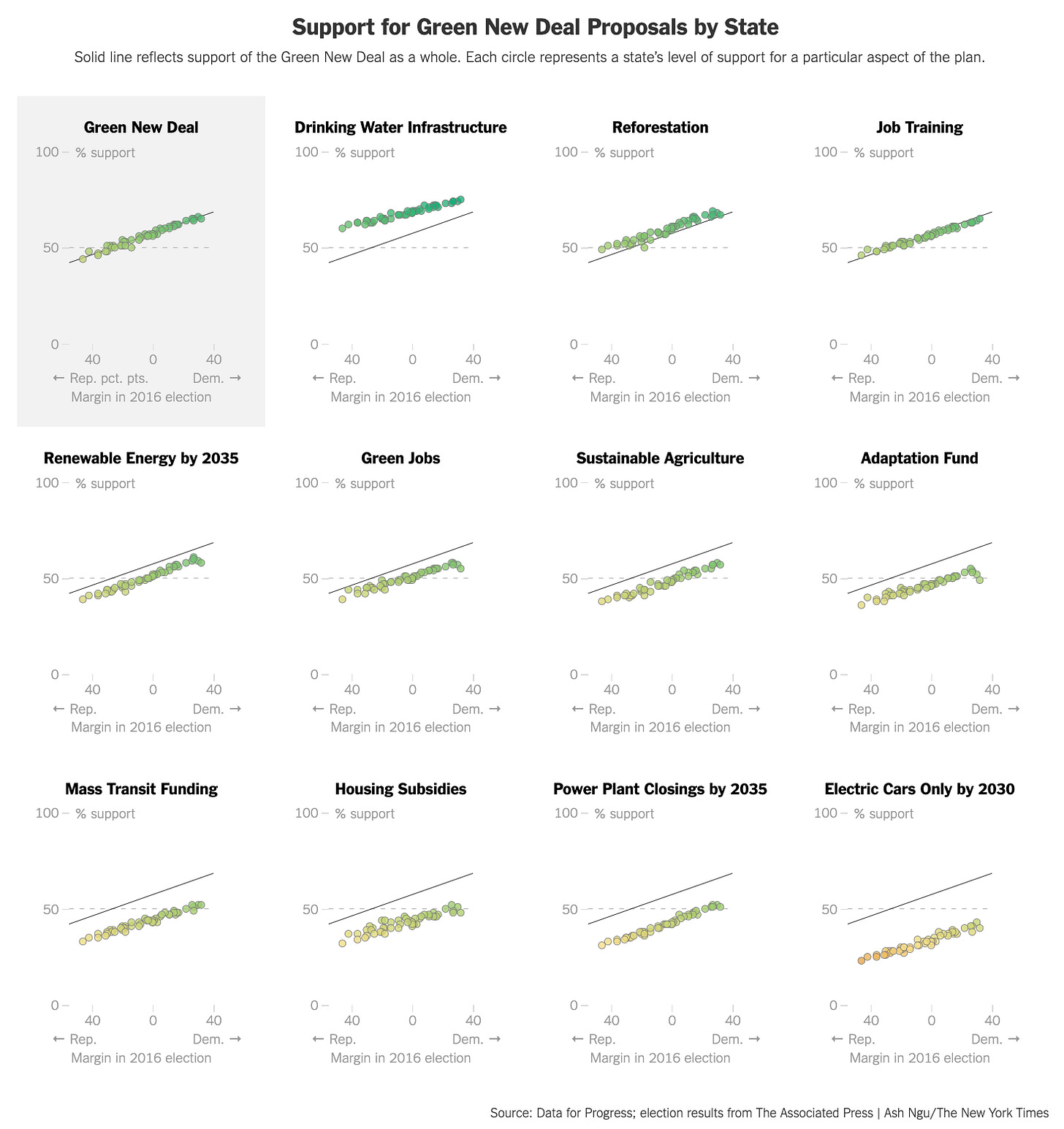
An Electoral College map that aggregates forecasters’ ratings, from Teagan Goddard: ElectoralVoteMap.com
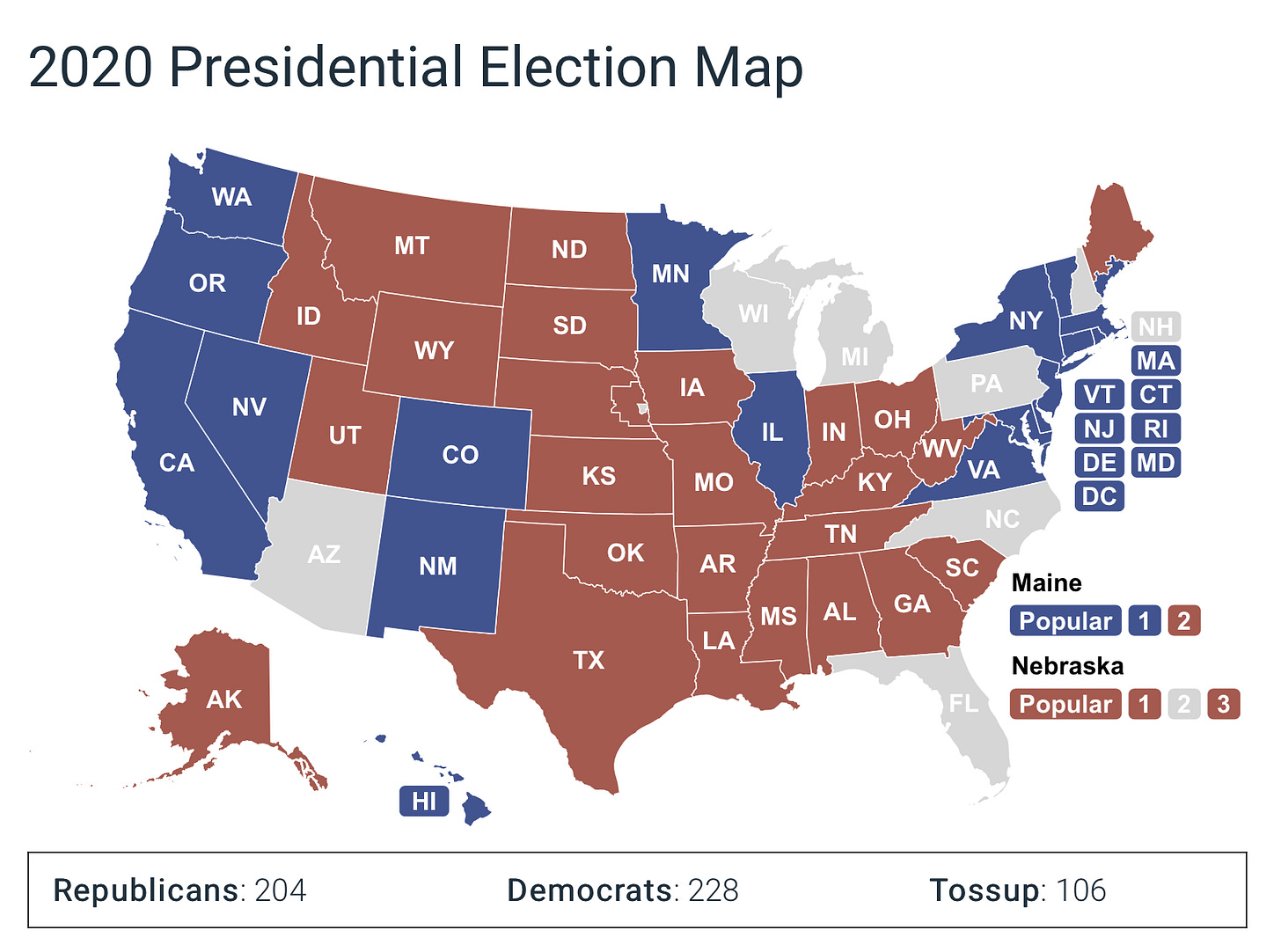
Other Data and Cool Work
From my colleague Sarah Leo: Mistakes, we’ve drawn a few
At The Economist, we take data visualisation seriously. Every week we publish around 40 charts across print, the website and our apps. With every single one, we try our best to visualise the numbers accurately and in a way that best supports the story. But sometimes we get it wrong. We can do better in future if we learn from our mistakes — and other people may be able to learn from them, too.
After a deep dive into our archive, I found several instructive examples. I grouped our crimes against data visualisation into three categories: charts that are (1) misleading, (2) confusing and (3) failing to make a point. For each, I suggest an improved version that requires a similar amount of space — an important consideration when drawing charts to be published in print
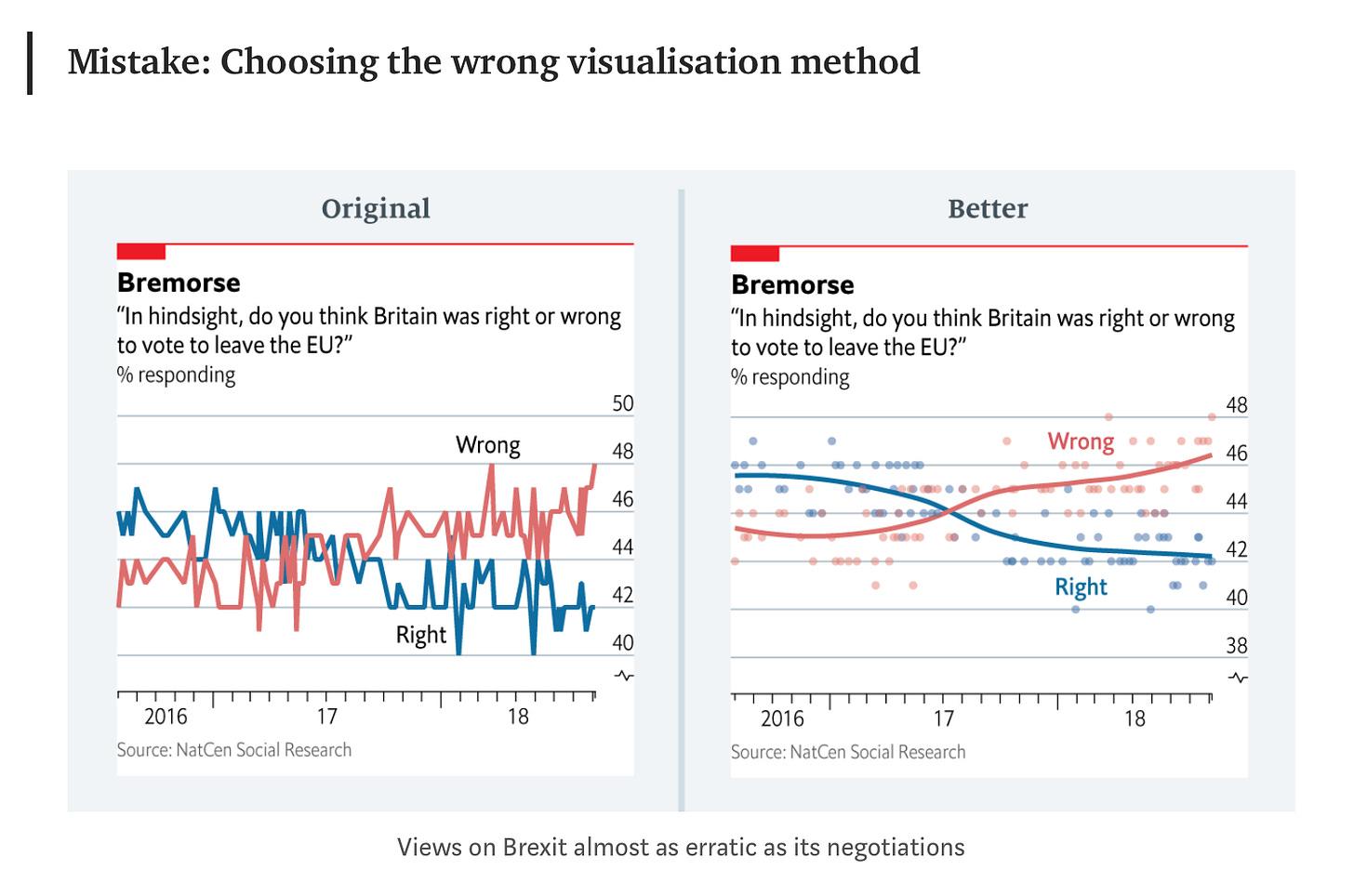
Political Science, Survey Research, and Other Nerdy Things
Faisal Islam: New survey raises doubts about whether the public still supports Brexit

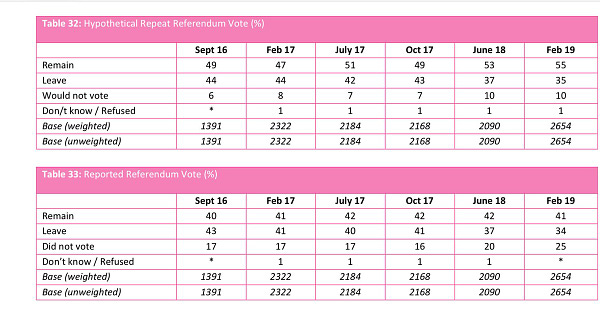
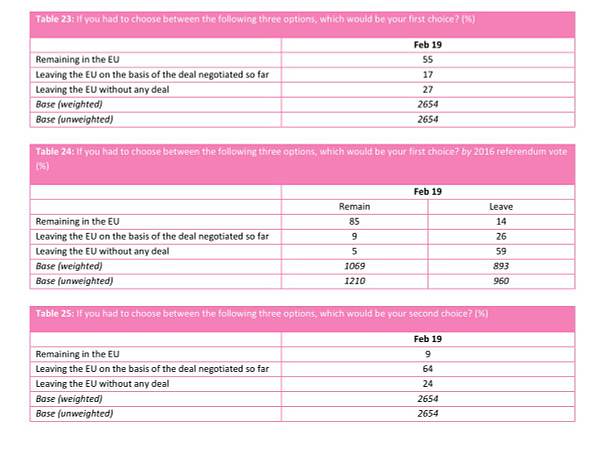
James Kanagasooriam: The reversal and upending of British voters’ priorities since 2005:

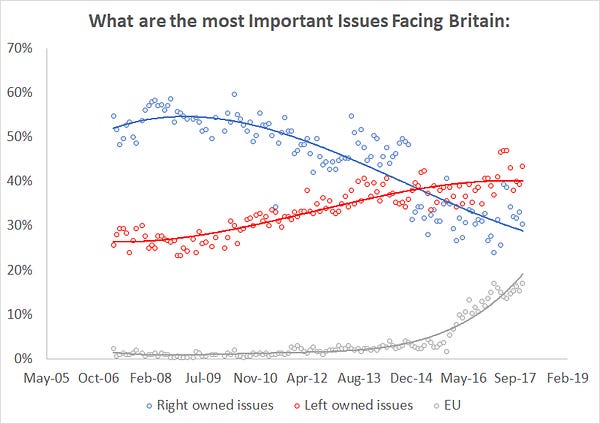
What I'm Reading and Working On
As noted above, I wrote about Mueller and Brexit last week. Next week, I’m crunching the data on confidence in the press and might write on several GOP-controlled state legislatures repealing ballot initiatives that passed lats November. I’m reading some Hemingway and also Philip Ball’s 2014 book Critical Mass: How One Thing Leads To Another, which is so far a very interesting tour of using science to answer important questions about society—AKA: how I spend the majority of my waking (and let’s be honest, dreaming) hours.
Thanks!
Thanks for reading. I’ll be back in your inbox next Sunday. In the meantime, follow me online or reach out via email. I’d love to hear from you!
A Special Thank-you Note to Patrons
My weekly newsletter is supported by generous patrons who give monthly on Patreon, including these individuals who have pledged especially charitable contributions:
Alden, Ben, Calvin, Christina, Daniel, David, Ed, Joshua, Joshua, Katy, Kevin, Laura, Robert, Robert, Thomas, Christopher
Ben, Bob, Brett, Charles, Charlie, Chelle, Darcy, Darren, David, Erik, Fred, Gail, Greg, Guillermo, Hunter, Jay, Jon, Malcolm, Mark, Nik, Nils, Sarah, Steven, Tal, Uri
Like the newsletter and want to help keep it going? Subscribe today on Patreon for access to private posts and other perks.



